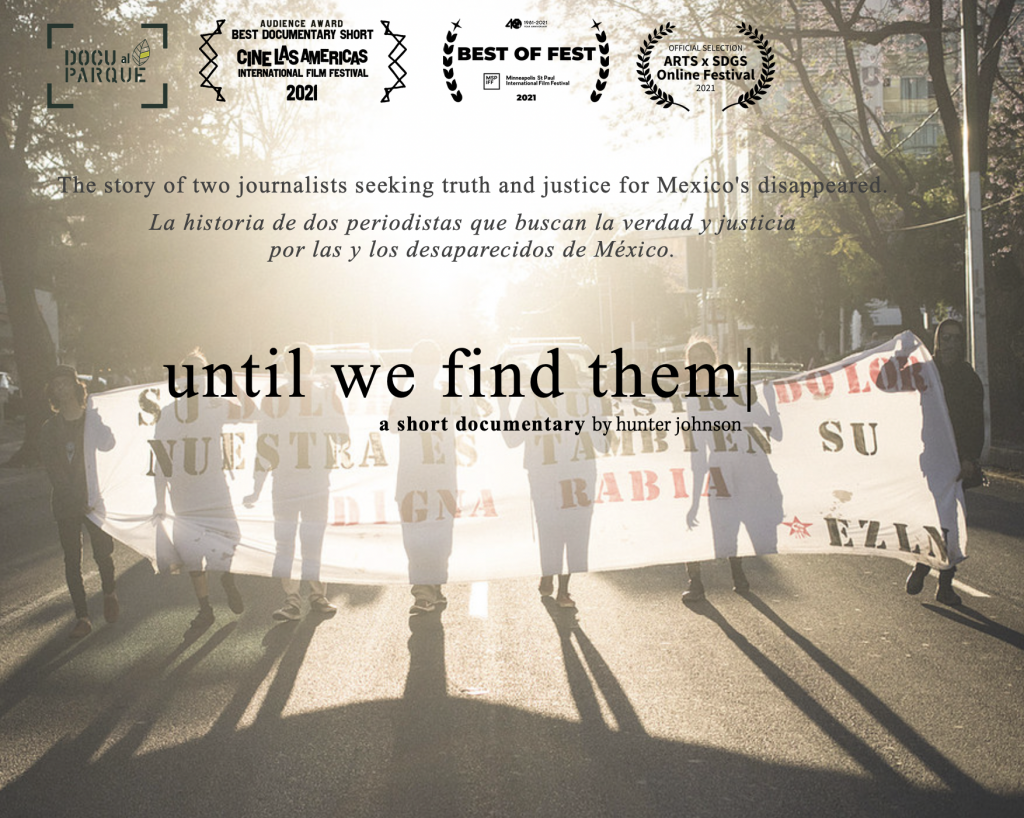Until We Find Them (2021) is a short documentary film directed by Hunter Johnson that premiered at the 40th Minneapolis St. Paul International Film Festival. At first glance, it is an intimate portrait of the affective and working relationship between two journalists residing in Guadalajara, Jalisco. But as we look into the lives of Darwin Franco and Dalia Souza, reporters for ZonaDocs, we experience the way in which the journalists interact daily with the universe of disappearances in México, which, in the context of The War against Drugs, has generated more than 80,000 disappearances.

As Darwin expresses, “In México, no one disappears. In México, people are disappeared.” Thus, his mission and his job are to make sure these events are never forgotten and that the fight of those who protest against the disappearances doesn’t go unnoticed. Johnson’s documentary, by focusing on the portrayal of Dalia and Darwin, also chases this purpose. Through the use of space, music, sound, testimonies, and intertextuality, Until We Find Them presents the spectator with two vast stages of the disappearance phenomenon.
The first stage is crude desolation; the documentary, through the testimonies of Dalia, Darwin, and the mothers of disappeared individuals, tries to explain the possible causes and consequences of the disappearances in México. In this landscape, for example, mothers explain how the criminalization of the victims has been used as a strategy by the government to justify the country’s militarization and silence the families of those who have disappeared.
In the same manner, Dalia expresses the difficulty of finding justice in a sea of high impunity levels and a multiplicity of perpetrators (mainly organized crime and agents of the state) that act either independently or collude to execute these crimes against humanity. And, finally, through the presentation of the spaces of the Servicio Médico Forense (Medical Forensic Service, SEMEFO) and the cemetery, Darwin gives an account of another crisis that sprouted from the violence of The War: a forensic crisis with the flooding of 40,000 unidentified bodies in which the state is accused of disappearing the disappeared twice, by incinerating unidentified bodies that were not even DNA tested. Visually profound, Johnson’s creeping camera movements and voice-over testimonies create an emotional atmosphere that echoes the gravity of the words that are being said by the participants.
The second stage presented by Until We Find Them also comes from the disappearance phenomenon, but it provides the spectator with a different look. It proves as Darwin mentions, that “as journalists, we have to be able to acknowledge the horror of the war, but we also have to be able to acknowledge how hope and love grow even in the darkest of places.” This stage is led by the families of the disappeared and the networks of support that are built around the victims of disappearances in México.
Through his lens, Johnson not only portrays these people and their daily struggle but through subtle yet precise close-ups, he emphasizes the importance of looking into the face of the families of the disappeared. He documents how mourning is shared through a hug, through contact with one another, and in the case of Darwin and Dalia, through journalistic articles that call for justice.
To understand how these support networks are created, the documentary makes heavy use of intertextuality. For example, by incorporating other perspectives the spectator gets to know one of Jalisco’s anti-monuments: The Glorieta de las y los desaparecidos (Roundabout for the Disappeared). The spectator also joins the mothers of the victims at the moment in which they, through their searches, find a bittersweet treasure: a person’s body.
Undoubtedly, the main contribution is that through these testimonies and scenes, Until We Find Them shouts a message for the Mexican and foreign spectator to hear, so that the disappearance phenomenon in México may change, as Dalia words it: “What needs to change is the meaning we, as people…give to the life, the dignity, and the integrity of the other. We have to understand that if something happens to her, to him, to you, to them, to whomever, it is also happening to me.”
If you wish to learn more about Until We Find Them or schedule a screening, visit: https://www.untilwefindthem.com/.
Olga Salazar Pozos is a Ph.D. Candidate of Hispanic Literature and Culture from the Department of Spanish and Portuguese Studies at the University of Minnesota. She has collaborated with the Observatory on Disappearances and Impunity in Mexico, a research project of the Human Rights Program at the University of Minnesota And, currently, Salazar is working on her dissertation, which is titled: “Between the Erasure of Violence and the Political Force of Collective Mourning: Artistic Representations of Mexico’s War on Drugs.”

Comments